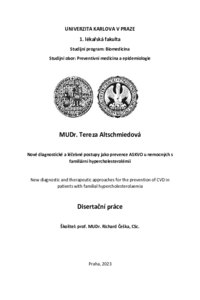Nové diagnostické a léčebné postupy jako prevence ASKVOu nemocných s familiární hypercholesterolémií
New diagnostic and therapeutic approaches for the prevention of CVD in patients with familial hypercholesterolaemia
dizertační práce (OBHÁJENO)

Zobrazit/
Trvalý odkaz
http://hdl.handle.net/20.500.11956/187248Identifikátory
SIS: 147925
Kolekce
- Kvalifikační práce [4899]
Autor
Vedoucí práce
Oponent práce
Rosolová, Hana
Rašlová, Katarína
Fakulta / součást
1. lékařská fakulta
Obor
Preventivní medicína a epidemiologie
Katedra / ústav / klinika
III. interní klinika - klinika endokrinologie a metabolismu 1. LF UK a VFN
Datum obhajoby
21. 9. 2023
Nakladatel
Univerzita Karlova, 1. lékařská fakultaJazyk
Čeština
Známka
Prospěl/a
Klíčová slova (česky)
familiární hypercholesterolémie, LDL cholesterol, statinová intolerance, PCSK9 inhibitoryKlíčová slova (anglicky)
familial hypercholesterolemia, LDL cholesterol, statin intolerance, PCSK9 inhibitorsAterosklerózou podmíněná kardiovaskulární onemocnění jsou v Evropě, navzdory moderní diagnostice a léčbě, stále nejčastější příčinou úmrtí. Přestože akcelerátorů aterosklerotického procesu je více, za kauzální rizikový faktor aterosklerózy je považován LDL-cholesterol. Familiární hypercholesterolémie (FH) je autosomálně dominantně dědičné onemocnění, které vinou sníženého množství či funkce LDL receptorů předurčuje své nositele k vysokým hladinám LDL-cholesterolu již od dětského věku. Určení kauzální mutace není vždy možné a diagnóza je stanovena pomocí různých skórovacích systémů, které kromě laboratorních hodnot LDL-cholesterolu zohledňují i osobní a rodinnou anamnézu a fyzikální nález. Léčba FH je celoživotní a k dosažení cílových hladin LDL-cholesterolu je kromě statinu, který je vždy základem léčby, často nutno volit kombinační terapii (ezetimib, moderní biologická léčba). Retrospektivní analýzou dat 1236 pacientů s diagnózou FH jsme potvrdili, že rizikovost těchto pacientů se liší v závislosti na přítomnosti dalších rizikových faktorů. V nejvyšším kardiovaskulárním riziku byli jedinci s vyššími hladinami nejen LDL a celkového cholesterolu, ale i triglyceridů a lipoproteinu Lp (a) a s přítomností dalších onemocnění (arteriální hypertenze, diabetes mellitus) či nikotinismu. Léčbu může komplikovat...
Atherosclerotic cardiovascular diseases are still the most common cause of death in Europe, despite new diagnostic methods and treatment. Although many accelerators of the atherosclerotic process are known, only LDL-cholesterol is considered to be the causal risk factor for atherosclerosis. Familial hypercholesterolaemia (FH) is an autosomal dominantly inherited disease whose carriers have had a high level of LDL-cholesterol since childhood due to reduced amount or function of LDL receptors . Determination of the causative mutation is not always possible and the diagnosis is established by using some scoring systems which take into account personal and family history and some typical signs (e.g. tendon xanthomas) in addition to LDL-cholesterol value. The treatment of FH is lifelong and to achieve the LDL- cholesterol target, combination therapy (ezetimibe, modern biologic therapy) in addition to statins , is often necessary. However statins are always the mainstay of the treatment. By retrospective analysis of data from 1236 patients diagnosed with FH, we confirmed the cardiovasular risk of these patients is different depending on the presence of other risk factors. At the highest cardiovascular risk were individuals with combination of risk factors - high level of LDL cholesterol and total cholesterol, as...
